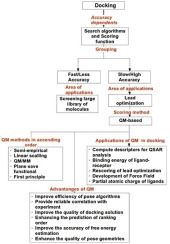Drug Discovery Today ( IF 7.4 ) Pub Date : 2017-07-05 , DOI: 10.1016/j.drudis.2017.06.012 Adebayo A. Adeniyi , Mahmoud E.S. Soliman

|
The greatest challenge in molecular docking (MD) is the deficiency of scoring functions (SFs), which limits their reliability. SFs are too simplified to represent the true features of the complex free energy of protein–ligand interactions. Investigations of docking functions have traded accuracy for speed through the use of approximations and simplifications. Consequently, there has been an increase in the popularity of quantum-mechanical (QM)-based methods as reference points for the development of fast, reliable, valuable, yet inexpensive, tools. As we discuss here, one significant QM-based parameter used to predict docking is the accuracy of atomic partial charges, which is strongly related to the accuracy of the SF prediction.
中文翻译:

在对接计算中实施质量管理:是否浪费了计算时间?
分子对接(MD)的最大挑战是评分功能(SFs)的不足,这限制了它们的可靠性。SF过于简化,无法代表蛋白质-配体相互作用的复杂自由能的真实特征。通过使用近似和简化,对接功能的研究已经将精度与速度进行了权衡。因此,基于量子力学(QM)的方法作为开发快速,可靠,有价值但又便宜的工具的参考点的普及已经增加。正如我们在这里讨论的那样,用于预测对接的一个重要的基于QM的参数是原子部分电荷的准确性,这与SF预测的准确性密切相关。


























 京公网安备 11010802027423号
京公网安备 11010802027423号